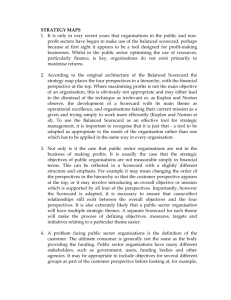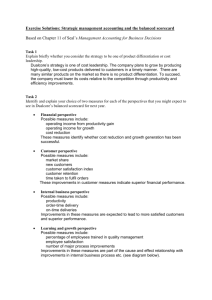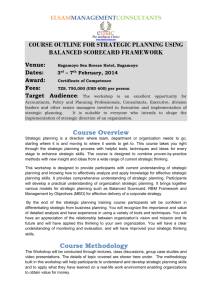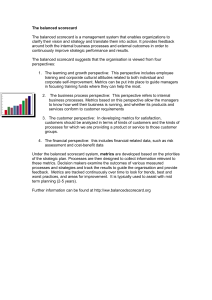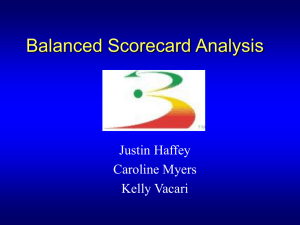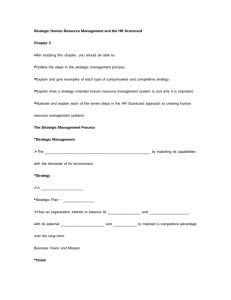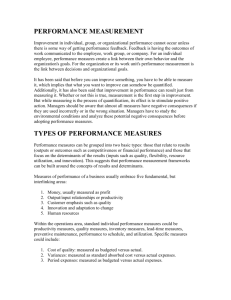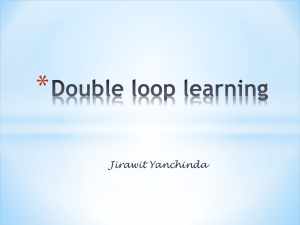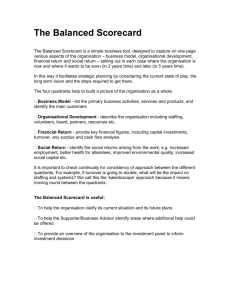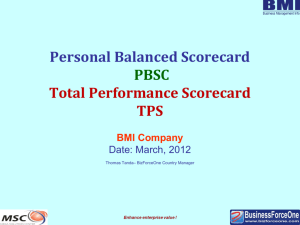Personal vision - Marshall Goldsmith
advertisement
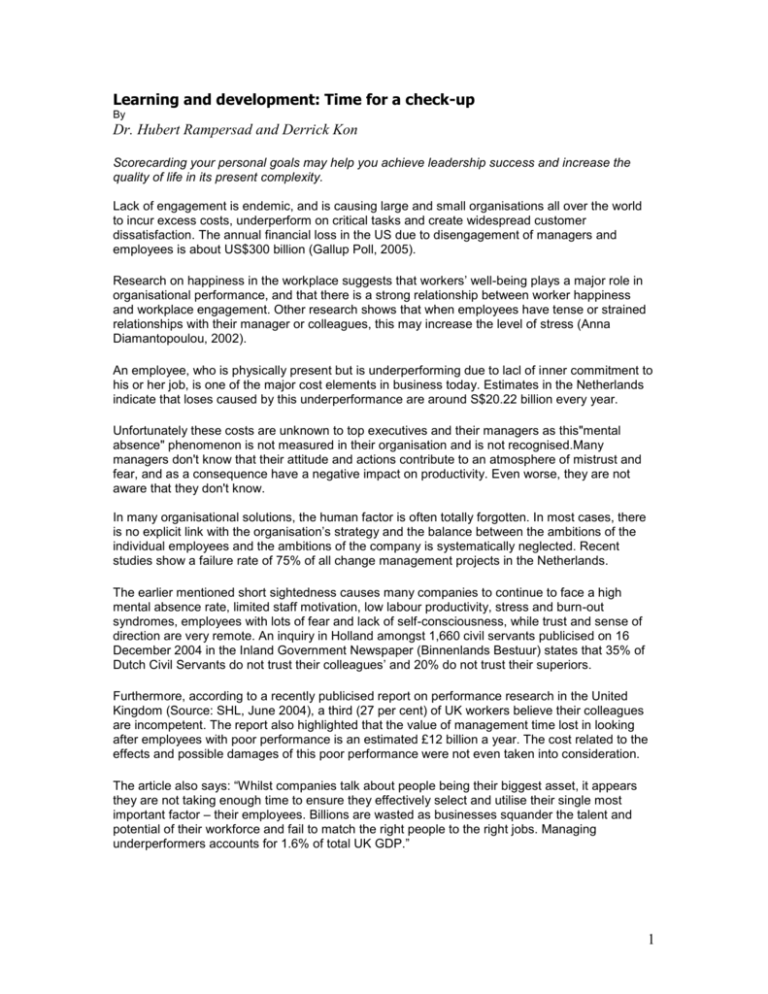
Learning and development: Time for a check-up By Dr. Hubert Rampersad and Derrick Kon Scorecarding your personal goals may help you achieve leadership success and increase the quality of life in its present complexity. Lack of engagement is endemic, and is causing large and small organisations all over the world to incur excess costs, underperform on critical tasks and create widespread customer dissatisfaction. The annual financial loss in the US due to disengagement of managers and employees is about US$300 billion (Gallup Poll, 2005). Research on happiness in the workplace suggests that workers’ well-being plays a major role in organisational performance, and that there is a strong relationship between worker happiness and workplace engagement. Other research shows that when employees have tense or strained relationships with their manager or colleagues, this may increase the level of stress (Anna Diamantopoulou, 2002). An employee, who is physically present but is underperforming due to lacl of inner commitment to his or her job, is one of the major cost elements in business today. Estimates in the Netherlands indicate that loses caused by this underperformance are around S$20.22 billion every year. Unfortunately these costs are unknown to top executives and their managers as this"mental absence" phenomenon is not measured in their organisation and is not recognised.Many managers don't know that their attitude and actions contribute to an atmosphere of mistrust and fear, and as a consequence have a negative impact on productivity. Even worse, they are not aware that they don't know. In many organisational solutions, the human factor is often totally forgotten. In most cases, there is no explicit link with the organisation’s strategy and the balance between the ambitions of the individual employees and the ambitions of the company is systematically neglected. Recent studies show a failure rate of 75% of all change management projects in the Netherlands. The earlier mentioned short sightedness causes many companies to continue to face a high mental absence rate, limited staff motivation, low labour productivity, stress and burn-out syndromes, employees with lots of fear and lack of self-consciousness, while trust and sense of direction are very remote. An inquiry in Holland amongst 1,660 civil servants publicised on 16 December 2004 in the Inland Government Newspaper (Binnenlands Bestuur) states that 35% of Dutch Civil Servants do not trust their colleagues’ and 20% do not trust their superiors. Furthermore, according to a recently publicised report on performance research in the United Kingdom (Source: SHL, June 2004), a third (27 per cent) of UK workers believe their colleagues are incompetent. The report also highlighted that the value of management time lost in looking after employees with poor performance is an estimated £12 billion a year. The cost related to the effects and possible damages of this poor performance were not even taken into consideration. The article also says: “Whilst companies talk about people being their biggest asset, it appears they are not taking enough time to ensure they effectively select and utilise their single most important factor – their employees. Billions are wasted as businesses squander the talent and potential of their workforce and fail to match the right people to the right jobs. Managing underperformers accounts for 1.6% of total UK GDP.” 1 No organisation is free of such issues but what is being done about it? This article talks about the Total Performance Scorecard and Personal Balanced Scorecard which aids the frustrating road towards sustained employee engagement and stress reduction. The Total Performance Scorecard (TPS) and the Personal Balanced Scorecard (PBSC) are two new management concepts whose aim is to make companies more “human”, warmer, make working fun, spell out fear and make things easier. These are the most important challenges in the corporate world that we should focus on. Integrity, trust, continuous learning and improvement are key values of this integrated and holistic approach. For the Personal Balanced Scorecard, it encompasses some of the following elements: Personal mission – your personal mission statement encompasses your philosophy of life and your overall life objectives. Personal vision – your personal vision describes where you want to go, the values and principles that guide you, what you stand for, and what you ideal job situation is. Key roles – this relate to the way you wish to fulfil the various essential roles in your life and thus realise your personal mission and vision. Personal targets – which is quantitative objective of a personal performance measure. Personal improvement actions – these are strategies used to realise your personal mission, vision and objectives. To illustrate how PBSC works, the personal ambition of Jack Johnson is shown below. He is the owner and CEO of a small management consulting firm in the UK, and a workaholic. He received complaints from customers frequently because of his rude behaviour and poor performance. His wife and children were also not quite happy with Jack because of the lack of balance between work and private life. Personal ambition of Jack Johnson Personal mission Enjoy the freedom to serve others and to create a world of love and empowerment. Personal vision I want to fulfil my mission in the following way: Earn the respect of my customers, colleagues, friends and loved ones Continue to look for challenges in my work, accept them and enjoy doing so Help organisations to be successful Continue to further develop my skills and competencies, and learn continuously Not act in conflict with my conscience Continue to increase my inner strength and keep this in balance with my physical health Achieve financial security Personal key roles In order to achieve my mission, the following key roles have top priority: Spouse: A maximum fulfilment of what is important for Karin, based on love, faithfulness, support and unconditional trust Father: Be an example for Frank and John so that they treat themselves and the people around them with respect and give them the ability to make the right choices and take decisions Consultant: Competent, honest, cooperative, and committed 2 Fellow man: Give and receive trust By outlining your personal goals, you begin to realise that you’re thinking and actions need changing in order to work smarter and free of fear. The solution to many organisational problems lies in balancing the work and private affairs and the matching of personal ambition with the organisation’s ambitions. This will create an atmosphere of open communication and cast away fear from the work floor. Whilst it is the ethical duty of top executives and managers to focus on stimulating an attitude and culture in their organisations, aimed at the continuous improvement and development of talent, individual and collective learning, employees also have the ethical duty and responsibility to develop themselves, work smarter and become more proactive. Some may ask whether this holistic integrated concept of organisational improvement and change management is possible? The experiences of major organisations, such as Philips Electronics, Shell Oil Company, and Schiphol Airport indicate strongly that it is. Our research shows that 50% higher employee satisfaction is achievable and we have observed 20% higher usage of people’s capacity and higher labour productivity from applying the Total Performance Scorecard and Personal Balanced Scorecard principles. This will likely help set your agenda for a radical shift from systems-driven change to self-led change. Case study: TPS in the police force Police Force Heusden-Zolder in Belgium received the European Foundation for Quality Management (EFQM) award based on the implementation of Total Performance Scorecard and Personal Balanced Scorecard. Reports have shown that upon the implementation of both tools, the police force now has “a clear leadership with a vision, mission and values, a system of performance measures geared to that mission and vision and a highly valued security and safety plan. There is also a good cooperation with different partners. This achievement is an example for other local police forces, more so in times where police reforms are still considered very difficult”. This recognition is therefore also a milestone in the police environment in Belgium. Geert Luypaert, zone chief, talks about how the Personal Balanced Scorecard was implemented in an informal way amongst the 55 employees. Luypaert says, “My natural management style is more or less people-based, and based on that approach I realise the value of the individual in our organisation. I act as a kind of confidant. All doors are always open here, including mine, and that makes it easier for employees to come here with their questions or problems. When I am aware of problems in their private life, I can take them into account and consideration.” “When our organisation expands though, we might have to use anchor points as larger organisations require more procedures. In a smaller organisation, much more is solved informally. We obviously have found the right balance between the procedural and the people oriented approaches.” 3 What happens when you find out as a manager that the personal vision of an individual does not fit the organisational vision? The individual is important but the organisational vision will still be primary. One can learn and try to take as many personal visions into consideration but in the end, the needs of the entire unit and the expectations of our stakeholders needs to be fulfilled. In another project which involved the world championship cycling and cycle-cross, the small police district with its limited management managed a smooth and harmonious go for the events. This would not have been possible if not for the well-arranged partnerships and strong employee involvement and commitment. Dr. Hubert Rampersad, president and Derrick Kon, managing director TPS 4
